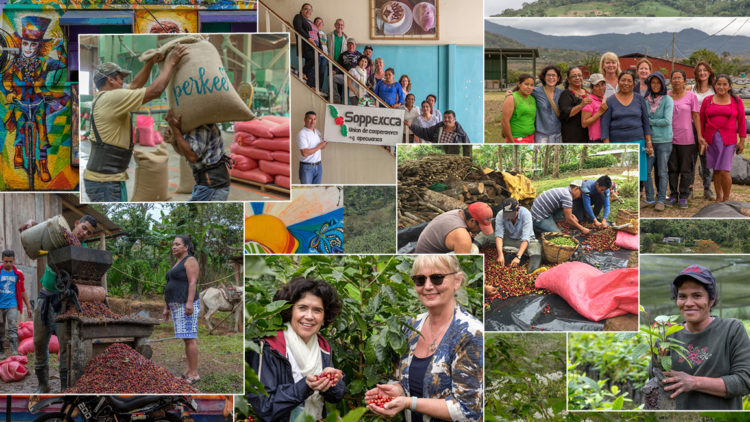
For me Perkee, a Fairtrade coffee is personal. It means my purchase can make a positive difference to someone else’s life. It connects me to the farmer who grew my coffee beans, or my bananas, my tea or made my chocolate. This is important because many of us do not realise the story behind the food we eat. Is the farmer paid fairly? Can they feed themselves? Do they have enough money to invest so they can create a sustainable future for them and their family?
I was truly shocked when I started to research the global chocolate industry. Next time you are biting into a chunk of (seemingly) delicious chocolate, please read the wrapper and find out where the chocolate comes from. That’s why I only buy Fairtrade chocolate, it has a 100% traceable supply chain. If more of us ask companies about their supply chain transparency, the big food companies will be forced to pay farmers fairly.
Perkee – a Fairtrade coffee that tastes good and does good
In 2016 we created Perkee coffee, which is grown by a wonderful female-led cooperative in Jinotega, Nicaragua. We were going great-guns until the pandemic hit. Increasing sales of coffee in our cafés and restaurants meant we could buy even more beans every year. We funded a biscuit making factory so the ladies who rake our coffee beans could have a year-round income. We started supporting young farmers who grow organic micro-lots. And in the last two year Perkee coffee won two Great Taste Awards. But due to the pandemic, even though more of us are ordering online, it’s not possible to replace the losses created by café and restaurant closures.
And another challenge for coffee farmers
I was lucky to visit Nicaragua in 2018 and meet the cooperative farmers who grow our Perkee coffee beans. I saw how terribly affected the coffee farmers were by climate change. Coffee that had grown at certain altitudes, doesn’t grow anymore. Drought makes the harvest times change, heavy rains cause floods and the farmers can’t harvest the coffee cherries. And now add a pandemic on top of these challenges. How do you harvest your coffee beans with social distancing and lockdown? How do you access healthcare if you live in remote areas? The plight of the farmers and their communities is even more perilous now.
You can be the change
We all have the power to change this situation. When you buy Fairtrade coffee you are guaranteeing the farmer (no matter how low the global price drops for their product) a minimum price. On top of this, the co-operative receives an extra Fairtrade Premium. The cooperatives chooses their own projects to invest in to benefit their businesses and communities. In Nicaragua the Soppexcca cooperative used the premium to;
- Educate young women to University level in agronomy
- Set up women’s health screening in remote locations
- Build organic fertiliser plants
- Provide sustainability training to the female farmers
- Business training for the next generation
Fairtrade fortnight raises awareness of Fairtrade, but just like a dog – it’s not just for Christmas or two weeks a year. Please consciously think about what you buy. If you see an alternative that is fair to the farmer – make the switch. I can’t tell you the difference you will make. I think of all the lovely people I met in Jinotega, who invited me into their homes, shared their stories and let me meet their families. If I don’t buy or inspire other to choose Fairtrade I am letting the Sopppexcca community down and my visit would be superficial and meaningless.
To make a difference, you can buy Perkee Fairtrade whole beans and ground coffee (including decaff) online at Amazon.
